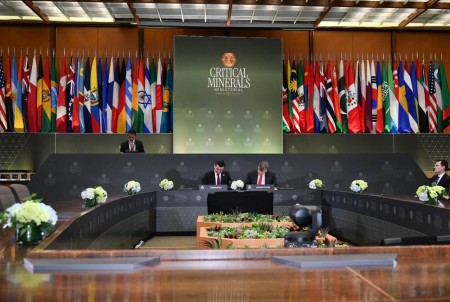President Shavkat Mirziyoyev approved the amended Labor Code on October 28. The document will take effect six months later, on April 30, 2023.
The Code was passed by the Legislative Chamber exactly one year ago and was approved by the Senate back in March 2022. Then it was reported that the current 1995 Code had been failing to meet modern trends and realities and does facilitate employers, in particular, to choose simpler forms of hiring additional workforce, and also had not been taking account of the active development of new various forms of labor activity in private sector .
The Ministry of Employment and Labor Relations among the main shortcomings of the old Code called a large number of reference regulations, its focus on maintaining jobs (rather than creating new ones), insufficient attention to regulating the work of homeworkers, workers hired by individual entrepreneurs, part-time workers, shift workers, temporary, seasonal and remote workers.
The new Code has been significantly expanded to include 7 sections, 34 chapters and 581 articles (in the current version - 294 articles). Among other things, duties are also indicated in addition to rights, both for employees and employers.
As the Ministry of Justice commented, in the new version of the code, the main principles of legal regulation of labor relations and public relations directly related to them are:
- equality of labor rights, prohibition of discrimination in the sphere of labor and occupation;
- freedom of labor and the prohibition of forced labor;
- social partnership in the sphere of labor;
- guaranteed provision of labor rights and performance of labor duties;
- inadmissibility of deterioration of the legal status of the employee.
The freedom of labor is deemed as the right of everyone to dispose of their abilities for work, to realize them in any form not prohibited by law, to freely choose their occupation, profession and specialty, place of work and working conditions. The Code expands the description of the concept of forced labor.
If, according to the current legislation, the amount of severance pay cannot be less than the average monthly wage, then under the new code, the amount of severance pay will depend on the length of service with the employer:
- for employees with work experience up to 3 years - from 50% of the average monthly salary;
- for employees with work experience from 3 to 5 years - from 75% of the average monthly salary;
- for employees with work experience from 5 to 10 years - from 100% of the average monthly salary;
- for employees with work experience from 10 to 15 years - from 150% of the average monthly salary;
- for employees with more than 15 years of experience - at least 200% of the average monthly salary.
The conditions for entering into, amending and terminating an employment contract have also been updated. In particular, a trial period is not established when hiring:
- a pregnant woman, a woman with a child under the age of three, or a father (guardian) alone raising a child under the age of three (previously it was only for pregnant women and women with children under three years of age);
- persons from among socially vulnerable categories of the population sent for employment to reserved jobs;
- graduates of higher educational institutions who studied on the basis of state grants and are employed in the specialty they have received in the direction within three months from the date of graduation from the higher educational institution;
- graduates of general secondary, secondary specialized, vocational and higher educational organizations who are employed independently in their specialty upon entering a job for the first time within one year (was three years) from the date of graduation from the relevant educational organization;
- employees with whom an employment contract is concluded for a period of up to six months (unchanged);
- persons under the age of 18;
- persons with whom the employer has previously terminated the employment contract on separate grounds, in case of their return to work;
- students who were trained by the employer under an industrial training contract;
A provisional trial can be established only when an employee is hired. It is not allowed to establish a provisional trial when transferring an employee to another job and seconding an employee to another employer.
The provisional trial period, as before, cannot exceed three months, and for heads of organizations, their deputies, chief accountants and heads of separate divisions of organizations - six months.
The inclusion in the employment contract of the following conditions shall be deemed invalid:
- worsening the condition of an employee in relation to labor legislation and other documents on labor;
- violating the requirement to prohibit discrimination in the sphere of labor and professional activity;
- violating the requirement to prohibit forced labor;
- forcing an employee to commit illegal actions, actions that violate the rights of other persons or the employee himself, threaten his life and health, undermine his honor, dignity or business reputation.
The invalidity of some terms of the employment contract shall not entail the invalidity of the employment contract as a whole.
The new Code also provides for the following innovations:
- expanding the grounds for emergence of individual labor relations (passing a competition and being elected to a position, sending an employee to work by an authorized state body, confirming the right to work when hiring a foreign citizen, and others);
- ensuring the principle of "gender neutrality" in the regulation of the labor of workers who combine work with family responsibilities;
- introduction of the concept of social partnership in the sphere of work, reflection of its features, definition of the content of the subject of social partnership and strengthening of its basic principles, determination of its regulations;
- digitalization of labor processes, maintaining an electronic work book, creating employment contracts in a single information base and introducing registration mechanisms;
- expansion of the grounds for termination of an employment contract, as well as the exclusion of the right to terminate an employment contract at the initiative of the employer in connection with the achievement of retirement age by the employee;
- establishing criteria for the mass dismissal of workers;
- expanding the circle of employees whose employment contract can be terminated on the grounds provided for by the employment contract itself (remote workers, homeworkers, employees of individual entrepreneurs, domestic workers);
- introduction of a mechanism for protecting personal data of employees;
- expansion of types of working time: shift work, flexible work schedule, division of the working day into parts, business trips and others;
- if a day off coincides with a holiday non-working day, the day off is transferred to the working day following the holiday non-working day;
- the introduction of leave with partial pay (taking into account the experience of implementing measures to combat the COVID-19 pandemic) and the extension of unpaid or partially paid leave up to a total of 6 months a year;
- clarification of the wage system, including hourly wages and requirements for it, determination of the minimum wage, regulation of the procedure and norms for paying wages, clarification of the features of the tariff and non-tariff wage systems;
- the procedure for determining and changing labor standards, introducing standard labor standards at the sectoral and intersectoral level, determining the employer's obligation to provide employees with normal conditions for fulfilling production standards;
and much more.
Work on the new Labor Code began in the spring of 2019, and in October of the same year, the Ministry of Labor submitted the draft for discussion.














